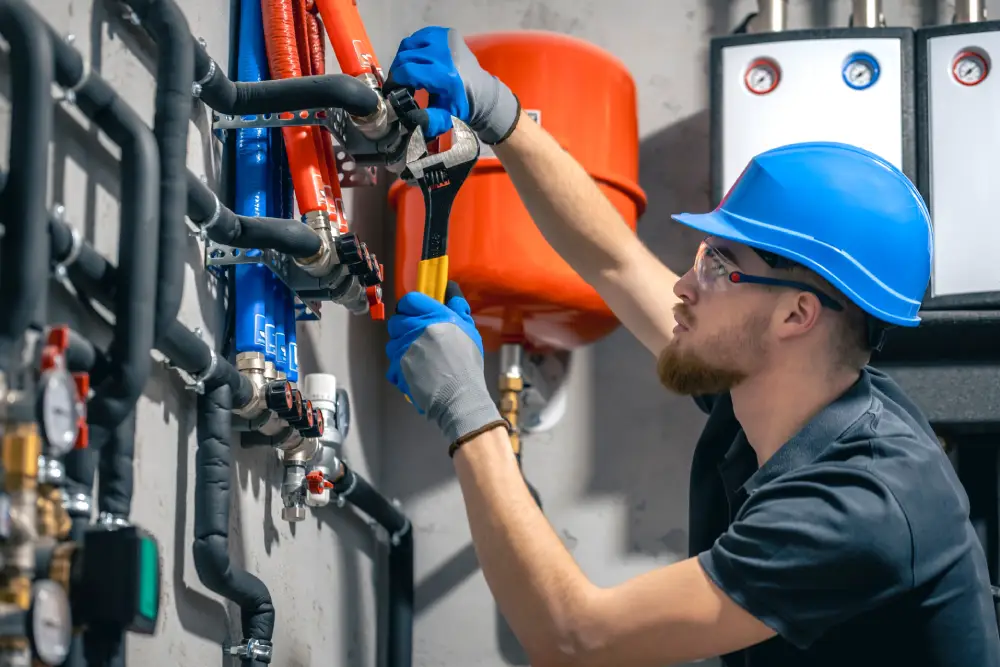Introduction
In modern building construction, MEP (Mechanical, Electrical, and Plumbing) systems play an essential role in ensuring functionality, safety, and efficiency. Among these, plumbing is a critical component that influences water supply, waste management, and overall building sustainability. A plumbing engineer is responsible for designing, installing, and maintaining plumbing systems that ensure reliable water distribution, sanitation, and fire protection. This article delves into the responsibilities of a plumbing engineer and their importance within MEP systems.
1. What is a Plumbing Engineer?
It is a specialized professional responsible for the design, development, and implementation of water supply and drainage systems within buildings. They work alongside mechanical and electrical engineers to integrate plumbing systems into the overall MEP framework. Their role extends beyond simple piping layouts to include:
- Designing water distribution networks.
- Developing efficient drainage and sewage systems.
- Implementing sustainable water conservation solutions.
- Ensuring compliance with local and international plumbing codes.
- Overseeing the installation and maintenance of plumbing infrastructure.
2. Key Responsibilities of a Plumbing Engineer
- Water Supply System Design
One of the primary tasks of a plumbing engineer is to design an efficient water supply system that ensures clean and uninterrupted water flow. This involves:
- Calculating water pressure and flow rates to optimize system performance.
- Designing hot and cold water distribution networks.
- Selecting appropriate materials and pipe sizes for different building types.
- Incorporating booster pumps, filtration systems, and water treatment solutions.
- Drainage and Waste Management
A well-designed drainage system is crucial to maintaining hygiene and preventing water damage. A plumbing engineer ensures effective waste disposal by:
- Designing drainage and sewage systems that prevent blockages and leaks.
- Implementing stormwater management solutions to prevent flooding.
- Integrating grease traps and separators for commercial kitchens and industrial setups.
- Ensuring compliance with environmental regulations for wastewater treatment.
- Fire Protection Systems
They also contribute to building safety by designing fire suppression systems. This includes:
- Installing sprinkler systems and standpipes for fire control.
- Ensuring adequate water pressure for fire protection.
- Integrating fire suppression solutions with overall MEP designs.
- Conducting routine inspections and maintenance of fire protection plumbing.
- Sustainable Plumbing Solutions
With the increasing focus on sustainability, plumbing engineers play a vital role in conserving water and energy. Key initiatives include:
- Implementing rainwater harvesting systems.
- Designing greywater recycling systems for non-potable uses.
- Selecting low-flow fixtures and water-efficient appliances.
- Using eco-friendly materials to reduce environmental impact.
- Compliance with Plumbing Codes and Standards
Every construction project must adhere to local and international plumbing regulations. A plumbing engineer ensures:
- Compliance with building and health codes.
- Adherence to safety standards in water supply and waste disposal.
- Proper documentation and approval of plumbing designs.
- Coordination with regulatory authorities for inspections and permits.
3. How Plumbing Engineers Contribute to MEP Systems
Plumbing engineers collaborate closely with mechanical and electrical engineers to ensure seamless integration of systems within a building. Their contributions include:
- Coordination with HVAC Systems: Ensuring proper water supply for heating and cooling systems.
- Integration with Electrical Systems: Designing plumbing layouts that work efficiently with electrical wiring and control panels.
- Optimization for Energy Efficiency: Reducing water and energy wastage through smart plumbing solutions.
- Risk Mitigation: Identifying potential leaks, pressure failures, or corrosion risks in advance.
4. Advanced Technologies in Plumbing Engineering
The field of plumbing engineering is evolving with technological advancements. Some innovative trends include:
- Smart Plumbing Systems: IoT-enabled leak detection and water flow monitoring.
- 3D Modeling and BIM (Building Information Modeling): Precise plumbing design and planning.
- Automated Water Management: Systems that adjust water usage based on occupancy and demand.
- High-Efficiency Fixtures: Water-saving faucets, toilets, and showerheads.
- Prefabricated Plumbing Components: Reducing installation time and improving efficiency.
5. Challenges Faced by Plumbing Engineers
While plumbing engineering is crucial, it comes with its own set of challenges:
- Space Constraints: Designing systems within limited space in high-rise buildings.
- Aging Infrastructure: Updating and maintaining old plumbing systems.
- Water Quality Issues: Ensuring potable water supply in regions with contamination concerns.
- Climate Change Impact: Designing flood-resistant and drought-proof plumbing solutions.
- Evolving Regulations: Keeping up with changes in plumbing codes and standards.
Conclusion
A plumbing engineer is an indispensable part of any MEP team, responsible for ensuring efficient water supply, drainage, and fire protection systems. Their expertise not only enhances building functionality but also contributes to sustainability and energy conservation. With advancements in technology and a growing emphasis on green construction, the role of plumbing engineers continues to evolve, making them a vital asset in modern infrastructure development. By integrating smart solutions and adhering to industry best practices, plumbing engineers help create safer, more efficient, and environmentally friendly buildings.

